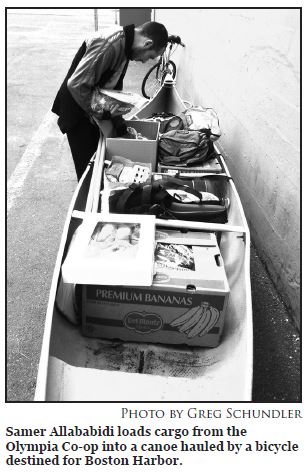Distributing Food without Fossil Fuelby Greg Schundler
True sovereignty is being able to say you don't want something and you don't need it. Consider food and energy. The most energy intensive part of the food distribution system is driving to the grocery store. Assuming a national average purchase of 35 pounds or less, and depending on location (especially islands and peninsulas), we spend 10 to 70 cents on gasoline per pound on food. These costs are multiplied when neighbors drive redundant routes for their errands separately. Dollars wasted on gasoline are a direct drain on the local economy. It is more economically, socially, and environmentally beneficial to pay a fellow Olympian to deliver groceries by canoe or bicycle than to drive to the store yourself. According to my calculations, we can pay underemployed Olympians $10 per hour to bike or canoe bulk discount-purchased food to neighborhoods for a $5-10 fee, less than current mainstream supermarket delivery service options ($13 plus a fuel surcharge), and sometimes less than an average grocery trip, especially if you value your time and factor in bulk discounting from neighborhood order-pooling. Internet ordering portals, even Facebook, would allow us to match supply and demand more precisely to eliminate waste. But there is a catch, for lowest delivery prices (highest efficiency) a full cargo load (300 lbs) must be spoken for, usually 10-20 customers per neighborhood delivery node. A little planning goes a long way. Cascadia Cargo Cooperative is a sustainable food distribution system in the South Puget Sound that can can support the vitality of a sustainable future by empowering our community. There is no patent to protect or profit to hoard, just citizens self-organizing around simple, clean technologies like the canoe, bicycle, and sailboat. Vegetable oil powered cars and boats can be added to the fleet too! Yet the greatest value in this proposition is not saving money, time, and gas, but employing human energy and demonstrating a tangible collective will. Imagine bicycles and canoes circulating our streets,trails, and waters full with the bounty of healthy local food, literally powered by our community. This is an opportunity to cultivate a sustainable relationship between our ecosystem and community, showing businesses, policy makers, and cynics that we are inspired to make change. It is a green effort that accomplishes the political holy grail of "creating jobs." And, to our benefit, the geography of the South Sound is particularly suitable for this project. Launching the Cascadia Cargo Cooperative has given me unique opportunities to connect to our community and place, I am grateful for all the help and encouragement along the way. Marinas, farmers, sustainability organizations, the Olympia Food Co-op, and a growing number of citizens are interested in cooperatively creating this system. If we do not like pipeline projects, tar sands, oil spills, and foreign oil wars, then we must aggressively address our gasoline consumption. If we want a sustainable economy, we need to think about how to create jobs. Sustainable food distribution is just one example of how we can self-organize to create alternatives. In the words of Richard Buckminster Fuller, "you never change things by fighting the existing reality. To change something, build a new model that makes the existing model obsolete." For more information, contact Greg Schundler at gregschundler@gmail.com, or learn more at http://www.slideshare.net/gregschundler/cascadia-cargo-cooperative. Greg Schundler lives in Olympia and is currently pursuing a Master's Degree in Geographic Information Systems and Sustainability Management at the University of Washington.
Back to Home page. |

 Discussions are happening at all institutional levels about how we can balance our social demands, economic expectations, and environmental concerns with constrained financial and natural resources. Are there free market solutions to reducing fossil fuel purchases and creating healthy employment? Can we make changes without massive infrastructure projects, technological overhauls, hated taxes, onerous laws, or political deadlock?
Discussions are happening at all institutional levels about how we can balance our social demands, economic expectations, and environmental concerns with constrained financial and natural resources. Are there free market solutions to reducing fossil fuel purchases and creating healthy employment? Can we make changes without massive infrastructure projects, technological overhauls, hated taxes, onerous laws, or political deadlock?